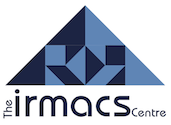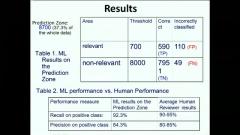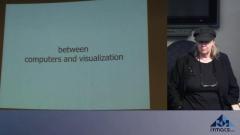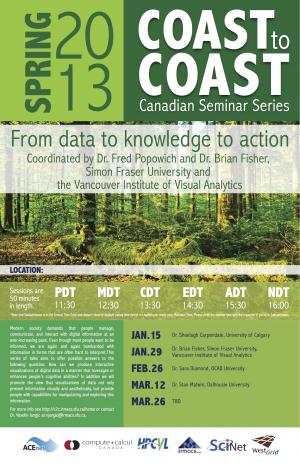This talk explores the larger implications of visual analytics-- "the science of analytical reasoning facilitated by interactive visual interfaces"-- for cognitive science and informatics. I will argue that the methods that will advance this new science go beyond those of natural science and engineering, and will require researchers to create a new translational cognitive science of analytic systems. We will begin by building field study methods that characterize human and computational cognitive capabilities as they are used for decision-making in a range of situations. Because findings from field methods do not generalize well, we must...
Coast to Coast Seminar Series
The Coast to Coast Seminar is an hour-long presentation given on a scientific topic and made accessible to audiences at a number of remote sites through collaboration technology. C2C seminars are held every two weeks throughout the academic year alternating between the West Coast and the East Coast of Canada.
The actual presentation is expected to be of high quality scientifically, yet accessible to a fairly general scientific audience. Accordingly, the seminars are widely advertised and attract audiences from various scientific fields, depending on the presenter’s topic.
SPRING 2013 C2C SERIES
The theme for the Spring 2013 Coast to Coast Seminar Series is "From data to knowledge to action". The coordinators of the series are Dr. Fred Popowich and Dr. Brian Fisher from the Vancouver Institute for Visual Analytics (VIVA), a joint initiative of SFU and UBC
Modern society demands that people manage, communicate, and interact with digital information at an ever-increasing pace. Even though most people want to be informed, we are again and again bombarded with information in forms that are often hard to interpret.
This series of talks aims to offer possible answers to the following question: How can we produce interactive visualizations of digital data in a manner that leverages or enhances people's cognitive abilities? In addition we will promote the view that visualizations of data not only present information visually and aesthetically, but provide people with capabilities for manipulating and exploring this information.
More Info: http://c2c.irmacs.sfu.ca/
Past Presentations
Tuesday, March 26, 2013
Tuesday, March 12, 2013
In this talk, we will review some of the recent applied text mining work at Dalhousie. We will argue the need for a text representation that would be more linguistically informed than the standard vector model. We will present one such proposal, in which a co-occurrence model takes into account the distribution of words throughout the corpus. We will then show how this representation is successfully applied in the task of categorizing dream descriptions by their emotional valuation (joint work with J. De Koninck and A. Razavi, Ottawa). We will round up the talk with our experience with some of the other text mining techniques used in the...
Tuesday, February 26, 2013
This talk underscores the importance of design methods and practices in approaching challenges in the representation of big data. The talk will first reference debates regarding the role and nature of aesthetics and the importance of these to perception and insight, providing illustrations of different aesthetic approaches, at times to the same data set. It will further the discussion of insight by considering ways to work with users and data sets that draw from different practices within design. Fundamentally, design and designers need to be part of the visual analytics equation.
Tuesday, January 15, 2013
Modern society demands that people manage, communicate, and interact with digital information at an ever-increasing pace. Even though most people want to be informed, all this information is frequently experienced as stress. It is not the information itself that is the problem, but the manner in which we are bombarded with information in forms that are often hard to interpret. How then can we produce interactive visualizations of digital data in a manner that enhances people's cognitive abilities? Ideally, these visualizations would not only present information visually and aesthetically, but provide people with capabilities for...







